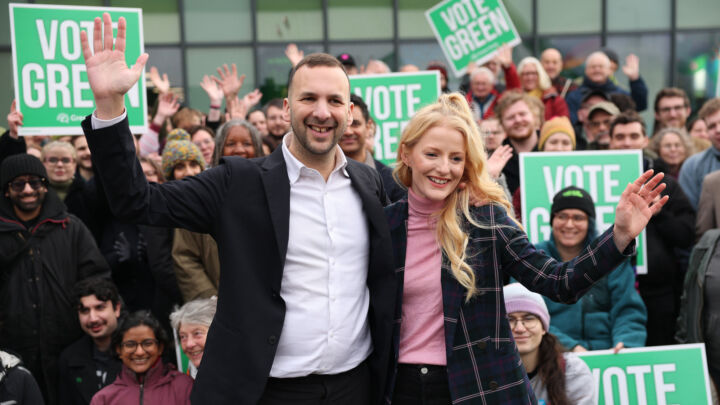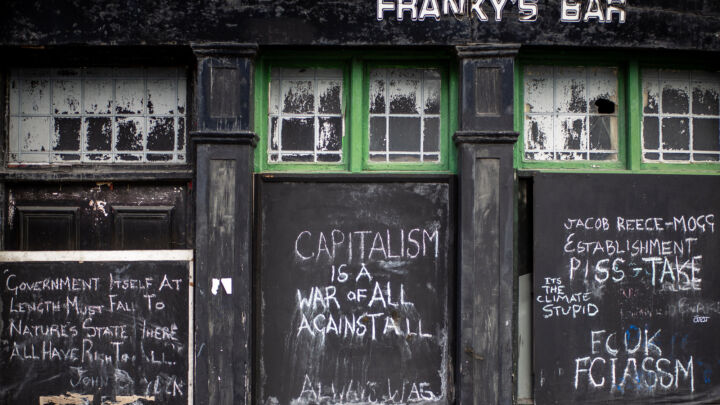The SNP and UKIP – separated at birth?
Salmond and Farage have more in common than they’ll ever admit.

Want unlimited, ad-free access? Become a spiked supporter.
All year Alex Salmond and Nigel Farage have been ever present in the news, and last week was no exception. While the Scottish National Party (SNP) leader’s altercation with Better Together’s Alistair Darling was watched by more than a million television viewers, the United Kingdom Independence Party (UKIP) leader announced his own candidacy as MP for South Thanet in Kent.
They are great foes, these men, and it’s not difficult to see why. While Farage seeks to reduce immigration, thwart the EU and claw back powers for the United Kingdom, Salmond wants Scotland to leave the UK and join the EU as an independent country. Farage is superficially every bit the SNP caricature: a southern Englander with a background in London’s financial sector. He is seemingly the opposite of everything the SNP likes to think of itself as: progressive, tolerant, open-minded, and with a profound concern for the welfare state.
Yet the more you hear them, the more you realise that they are part of the same phenomenon, the same populist wave that has swept Europe this year: the revolt of the dispossessed against the elites.
For instance, Salmond’s favourite linguistic tactic is to invoke the spectre of ‘Westminster’ or ‘the London government’ as some kind of incomprehending, remote behemoth from which Scotland should liberate itself. And Farage, when not comparably carping about Brussels, can be guaranteed to speak witheringly of the ‘liberal metropolitan elite’, by which he means ‘rich, left-wing Londoners’. The defining character of both UKIP and the SNP now is that they are both anti-London parties.
Sure, back in the 1960s, and certainly the 1930s, the SNP was a genuinely nationalist movement, as much concerned with Scottish culture and history as with politics. And the fringe party that UKIP was in the 1990s overwhelmingly drew its support from a nucleus of dedicated anti-EU businessmen.
But the SNP today has become rather like the Green Party: an old-time leftist party in all but name. Despite a few noisy reactionaries, the SNP has become far less anti-English, and now defines itself as guardian of the NHS and the welfare state in the face of selfish, free-market fundamentalists from London. This is why many English who reside in Scotland say they will vote ‘Yes’. ‘I am appalled at the failure of socio-economic neoliberalism that creates a tiny powerful elite while marginalising everybody else’, wrote one English pro-independence supporter to The Times. ‘That Scotland has a chance to shake off the legacy of elitism and exclusion is fantastic.’
Likewise, UKIP’s raison d’être has long been its opposition to Brussels. Its support now extends way beyond the golf clubs of Surrey, and up to Cambridgeshire, East Anglia, the Midlands, Lincolnshire and rural Lancashire and South Yorkshire. While in the south of England it’s backed by disaffected Tories, in the north it garners support from a white working class that feels ignored and betrayed by this ‘liberal metropolitan elite’. Like the SNP, the northern wing of UKIP casts itself as champion of the welfare state, with its publicity promising to ‘protect your benefits’. And, according to The Times this week, down south in Clacton, Essex, which will almost certainly elect Britain’s first UKIP MP next month, not only do almost 30 per cent of those who voted Conservative in 2010 say they will vote UKIP in the forthcoming by-election, but 45 per cent of Labour voters also say they will do, too.
This is why in May’s European elections, UKIP, usually dismissed by Scots nationalists as Little Englanders, even won a seat in Scotland. This horrified Salmond, of course. It ruptured his narrative. But it shouldn’t have surprised us. A recent survey by the Scottish Centre on Constitutional Change at Edinburgh University asked respondents if they thought the UK should reassert its independence. While in England 40 per cent thought the UK should, in Scotland 32 per cent thought it should. Elsewhere, a recent British Social Attitudes survey showed 69 per cent of Scots want immigration reduced, compared with 77 per cent of UK voters overall. These figures puncture the myth of a vast cross-border cultural disparity that Salmond would have us believe exists.
Borderline xenophobia, a good dollop of crackpot members, over-enthusiastic internet campaigners, cheap jibes at near neighbours, invective directed towards ‘the Establishment’: it’s easy to spot the resemblance between the two parties sometimes. But this isn’t to be dismissive. The French have been drawn to the Front National and the Italians to the comedian Beppe Grillo’s Movimento Cinque Stelle for similar reasons. There are multitudes who feel that globalisation has done little for them, and mainstream parties even less. These people regard open borders and open markets as a threat, a benefit only for big business leaders and the wealthy middle classes – both of whom seek cheaper, nay exploitative, labour. Salmond and Farage have the same foe: neoliberals.
The problem has been made more acute by the ascent of London in the past 30 years – it has become one of the six truly global cities in the world (the others being New York, Tokyo, and, ominously, three city-states: Singapore, Hong Kong and Dubai). As a consequence, the rest of the UK’s relative poverty – as a report last week reaffirmed – has been thrown into greater relief. The SNP constantly draws attention to this widening disparity. Salmond disparages London as a ‘dark star’ that remorselessly sucks in all the talent from the rest of Britain. And he has a point.
While elder, old-fashioned UKIP supporters deride London on account of it not feeling very English any more, there are younger UKIP supporters who bemoan the financial disparity between the capital and the rest of the country, not least because many of them are ex-Londoners who can’t afford to live and raise families there any more. The superior reaction of London liberals to the EU election results – ‘We’re far too enlightened to vote UKIP’ – only compounded provincial England’s sense of fury and grievance.
Those who believe the SNP and UKIP are bad for Britain haven’t been looking in the right place. Overt Scottish nationalism and EU-phobia can at times be superficial distractions, but London is as much the problem. So what to do with one of the globe’s truly great cities? That’s the conundrum. But as an ex-Londoner and now provincial type myself, I would first of all ask of the ‘liberal metropolitan elite’ and the capital’s plutocrats: how about a bit more humility and understanding?
Patrick West is a spiked columnist.
You’ve hit your monthly free article limit.
Support spiked and get unlimited access.
Support spiked and get unlimited access
spiked is funded by readers like you. Only 0.1% of regular readers currently support us. If just 1% did, we could grow our team and step up the fight for free speech and democracy.
Become a spiked supporter and enjoy unlimited, ad-free access, bonus content and exclusive events – while helping to keep independent journalism alive.
Monthly support makes the biggest difference. Thank you.











Comments
Want to join the conversation?
Only spiked supporters and patrons, who donate regularly to us, can comment on our articles.